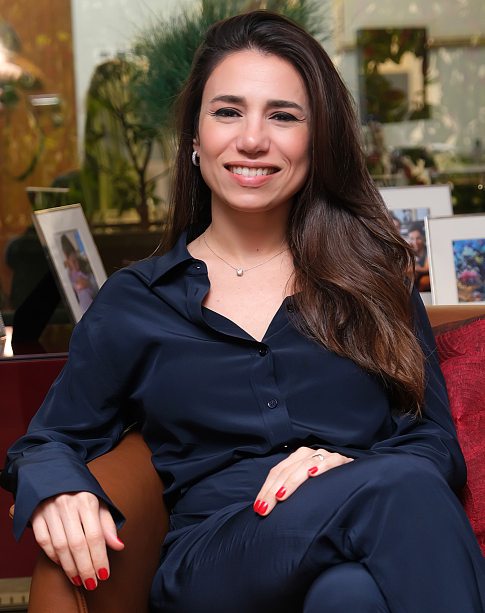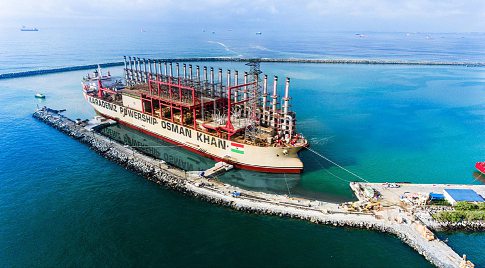Zeynep Harezi Yilmaz:
«Karpowership contributes to advancing universal access to energy»
Zeynep Harezi Yilmaz is the Chief Commercial Officer of Karpowership, a global Turkish company renowned for its floating power plants. Educated at Hamilton College and the London School of Economics, she is also co-founder of the One World Karadeniz Foundation, which works to promote education, women's empowerment and humanitarian aid. We spoke to this committed leader, for whom Africa represents a strategic opportunity.
AM: Your company is currently experiencing rapid growth across Africa. Would you say that your business model is particularly well suited to the continent's needs?

Zeynep Harezi Yilmaz: With over 10,000 MW of installed capacity in 16 countries across four continents, Karpowership is working to provide universal access to cleaner electricity. Africa is one of our major markets, with projects underway in Ghana, Gabon, Guinea, Côte d'Ivoire, Mozambique, Senegal, Sudan and Sierra Leone. Demand for electricity is rising sharply, particularly on the continent, where economic growth and energy needs are increasing. Our ability to deploy solutions within 30 days of signing a contract positions us as a key partner in securing energy supply while supporting a more resilient mix.
Is your model transitional or sustainable in the long term?
Our Powerships may seem temporary, but their lifespan is comparable to that of land-based infrastructure. We offer contracts of up to 20 years. In Ghana, we have been supplying around 25% of the electricity for over ten years. In Gabon, two of our power plants cover 25% of demand. Their flexibility and performance make them a viable long-term solution, while supporting the transition to cleaner energies.
Your projects are generally praised for their positive impact on local populations. That said, questions sometimes arise about the pricing of your services. Could you explain the principles behind your pricing structure?

Our floating power plants are compatible with different fuels, including natural gas (LNG), which allows us to diversify our sources and limit price-related risks. Thanks to our global presence, we have strong partnerships with fuel suppliers. We also enable countries to exploit their local resources. In Ghana, the use of local natural gas connected to our Powership generates approximately US$150 million in annual savings. Our projects are self-financing, with no construction costs for governments. Long-term contracts enable us to offer competitive rates.
How does Karpowership reduce its carbon footprint?
Our ships run on LNG, or liquid fuel. We launched the first LNG-to-power project in Africa, in Senegal. Similar transitions are underway in Gabon, Guinea and Côte d'Ivoire. LNG reduces CO2 emissions by 20 to 30% compared to liquid fuels, while also limiting fine particulate matter. It's a realistic transitional solution towards renewable energies.
Do you contribute to local development in the countries where you operate?
Yes, we recruit and train locally. In Ghana, around 200 jobs have been created. In Gabon, more than a third of our crew is made up of local talent trained by our teams. As a family business, we give meaning to what we do. We believe that access to electricity is a fundamental right. We are proud not only of our role in accelerating universal access to energy, but also of the socio-economic impact of our projects, involving local employees, subcontractors and suppliers, passing on valuable skills and creating concrete opportunities.
What CSR initiatives have you undertaken?
At Karpowership, we believe that access to energy goes hand in hand with social progress. Which is why we're developing concrete initiatives in education, health, equal opportunities and community empowerment. Energy poverty has a gender bias: women represent a significant proportion of the 600 million people in Africa who still have no access to electricity. As a female leader in the energy industry, I have seen how their under-representation hinders their future: lack of opportunities, low retention in technical professions, little progress. To address this, we launched the Girl Power programme in 2014, offering scholarships to young girls who want to study science, technology, engineering or mathematics. And in 2024, we founded the One World Foundation, which brings together several social initiatives, including Women in Energy Africa in partnership with the World Bank. Our commitment also extends to coastal communities, where the sea is an essential source of life and income. We support the empowerment of fishermen through concrete projects: equipment, training, and processing infrastructure. These efforts strengthen their economic independence while promoting sustainable management of marine resources. In total, more than 290,000 people worldwide have already benefited from our social programmes, particularly in Africa, where we also carry out orphanage renovation, food support and healthcare access initiatives. Our ambition is to make energy a driver of development, equality and dignity.
What are your future projects in Africa?
Our ambition is to continue expanding our presence around the world, offering energy solutions that open the door to access to electricity and fuel economic development, including in Africa, this magnificent continent where every ray of energy is a promise of fulfilment and every light a spark of hope for a sustainable future.